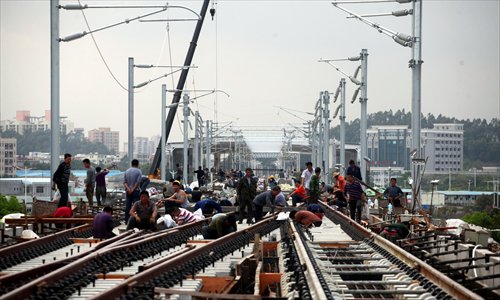HOME >> BUSINESS
AIIB to be based on business principles
By Song Shengxia and Hu Weijia Source:Global Times Published: 2015-3-22 23:33:02
China’s role a responsibility, not a privilege: official

Workers lay out tracks for an intercity rail project in Dongguan, South China's Guangdong Province. Photo: CFP
Being the largest shareholder in the China-proposed Asian Infrastructure Investment Bank (AIIB) gives China responsibility rather than a privileged position, and the new bank will be operated according to business principles, an AIIB official said Sunday.
China's position as the biggest shareholder in the bank is determined by the country's economic prominence in Asia. But it will give China responsibility rather than privilege, Jin Liqun, secretary-general of the Multilateral Interim Secretariat for Establishing the AIIB, said at the China Development Forum held in Beijing on Sunday.
With more countries joining the bank, China will dilute its shareholding, Jin noted. Also, the AIIB will seek to make decisions based on unanimous agreement rather than voting share, he said.
The AIIB will be operated according to business principles and seeking investment returns is a must, Jin said.
The AIIB will be complementary to the World Bank and Asian Development Bank (ADB) rather than a substitute for them, and will seek to improve the existing international financial system rather than overturning it, Jin said.
Takehiko Nakao, president of the ADB, told the same forum that it is understandable for China to design such a bank because there is a vast need for infrastructure financing in Asia.
"Together with the AIIB, we can do better things for the region," Nakao said Sunday.
The AIIB, initiated by China in October 2014 to spur infrastructure investment in Asia, has been touted as a potential rival for existing financial institutions, with reports saying that the US has quietly dissuaded some large countries from joining the AIIB.
Chinese Finance Minister Lou Jiwei said at the forum Sunday that the AIIB and ADB are discussing ways to cooperate.
Christine Lagarde, managing director of the IMF, also told the forum that the IMF welcomes the AIIB, adding that there will be massive room for cooperation between the two institutions.
The IMF is not in the business of financing infrastructure projects, so there will not be any competition between the IMF and the AIIB, she said.
"A number of major economies have recently announced their intention to join the China-led AIIB as founding members, which has helped to boost the bank's global representation and has attracted increasing attention from existing multilateral financial institutions," Xu Hongcai, an economist with the China Center for International Economic Exchanges, told the Global Times on Sunday.
On Friday, Switzerland announced it was planning to join the AIIB. Several other European countries including France, Germany, Italy and the UK have also announced their intention to join the AIIB as founding members during the last two weeks.
"Asia, the world's fastest-developing region, has huge demand for infrastructure development, which attracted interest from those European countries to join the AIIB as founding members," Wang Yongzhong, a research fellow with the Institute of World Economics and Politics at the Chinese Academy of Social Sciences, told the Global Times on Sunday.
These countries' decision to join the AIIB was made solely for economic reasons, as they can benefit from stronger decision-making power as founding members, Wang said.
A total of 33 countries and regions so far have shown their intention to join the bank as founding members. China has said nations could join as founding members of the bank until March 31.
According to Jin, the number of founding members will exceed 35 by the end of March.
Japanese Finance Minister Taro Aso was quoted by Reuters as saying on Friday that Japan could consider joining the AIIB if it could guarantee a credible mechanism for providing loans.
But according to the Reuters report, other officials in Japan were more cautious given concern about Japan's relations with the US and the AIIB's potential rivalry with the ADB.
Kiyoyuki Seguchi, a Japanese scholar and research director of the Canon Institute for Global Studies in Tokyo, said in an article published Friday in the Global Times Chinese edition that Japan should join the AIIB as a founding member as soon as possible.
Cooperation between China and Japan will bring huge benefits to Asia, and Asia's development will also bring opportunities for Japan's investment, machinery and construction fields, he noted.
"If Japan, a key US ally in the Asia-Pacific region, joins the AIIB as a founding member, it would put pressure on the US," Xu said, adding that both Japan and the US should join the AIIB to boost infrastructure construction and economic growth in Asia.
Posted in: Economy